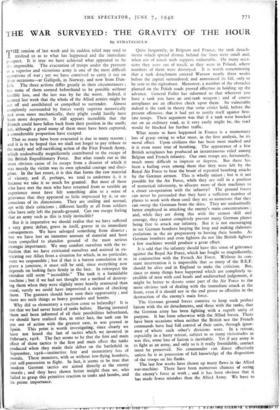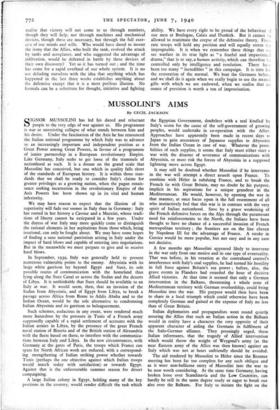HE WAR SURVEYED : THE GRAVITY OF THE HOUR
By STRATEGICUS
TIFIE tension of last week and its sudden relief may tend to mislead us as to what has happened and the immediate prospect. It is true we have achieved what appeared to be dye impossible. The evacuation of troops under the pressure of a superior and victorious army is one of the most difficult operations of war ; yet we have contrived to carry it out on tree occasions—at Gallipoli, in Norway, and now from Dun- kirk. The three actions differ greatly in their circumstances ; but none of them seemed beforehand to be possible without terrible loss, and the last was by far the worst. Indeed, it seemed last week that the whole of the Allied armies might be cut off and annihilated or compelled to surrender. Almost completely surrounded by forces vastly superior numerically and even more mechanically, their plight could hardly have been more desperate. It still appears incredible that the French could have fallen back from their position in the south; yet, although a good many of them must have been captured, a considerable proportion have escaped.
That so many have been evacuated is due to many reasons ; and it is to be hoped that we shall not forget to pay tribute to the steady and self-sacrificing action of the First French Army, which undoubtedly magnificently contributed to the escape of the British Expeditionary Force. But what stands out as the most obvious cause of its escape from a disaster of which it was merely the victim was its own splendid courage and disci- pline. In the last resort, it is this that forms the raw material of victory, and if, perhaps, we tend to underrate it, it is because we take it so much for granted. But most of those who have met the men who have returned from so terrible an experience must have felt something akin to a sense of grievance that they appeared so little impressed by it, so un- conscious of its dimensions. They are smiling and normal, apt with their criticisms ; different hardly at all from soldiers who have only left the parade-ground. Can one escape feeling that an army such as this is truly invincible?
But it is imperative we should realise that we have suffered a very grave defeat, grave in itself, graver in its immediate consequences. We have salvaged something from rlisasus ; but we have lost an immense amount of material and have been compelled to abandon ground of the most serious strategic importance. We may comfort ourselves with the re- flection that we have extricated ourselves and assisted in ex- tricating our Allies from a situation for which, in no particular, were we responsible ; but if that is a barren consolation in so grave a juncture, it must still be said, since everything now depends on looking facts firmly in the face. In retrospect the mistakes still seem " incredible." The tank is a formidable machine ; but if we had not thought out a method of destroy- ing them when they were slightly more heavily armoured than usual, surely we could have improvised a means of checking them. The gunners should have seen their opportunity ; and there are such things as heavy grenades and bombs.
Why did so elementary a reaction come so belatedly? It is not that we had never heard of tanks before. Having invented them and been informed of all their possibilities beforehand, we should have realised that, in strict fact, the tank can be put out of action with the greatest ease, as was proved in Spain. This point is worth investigating, since clearly we have not heard the last of tactics which we invented in February, 1918. The fact seems to be that the first and main effect of these tactics is the first and main effect the tanks produced when they made their debut on the battlefield in September, 1916—instinctive fear and momentary loss of morale. These monsters, with or without low-flying bombers, put self-possession to flight. In fact, it seems to be true that modern German tactics are aimed directly at the enemy morale ; and they have shown better insight than we, who failed to grasp this primitive reaction to tanks and bombs, and its prime importance. Quite frequently, in Belgium and France, the tank detach- ments which spread dismay behind the lines were small and, when out of touch with support, vulnerable. On many occa- sions they were out of touch, as they were in Poland, where numbers of them were destroyed. It is worth remembering that a tank detachment entered Warsaw nearly three weeks before the capital surrendered, and announced its fall, only to be sent to the rightabout. Moreover, a number of the obstacles planted on the Polish roads proved effective in holding up the advance. General Fuller has informed us that wherever you have a tank you have an anti-tank weapon ; and of course aeroplanes are an effective check upon them. So vulnerable indeed is the tank in theory that some critics held, before the present offensive, that it had yet to justify itself against first- rate troops. Their argument was that if a tank were knocked out on an ordinary road, as it very easily might be, the road would be blocked for further traffic.
What seems to have happened in France is a momentary loss of grasp owing to what must, in the first analysis, be its moral effect. Upon civilians this has been most marked and it is even more true of bombing. The appearance of a few British aeroplanes has produced an instantaneous relief among Belgian and French infantry. Our own troops are, fortunately, much more difficult to impress or depress. But there has been a feeling even among them that they were left by the Royal Air Force to bear the brunt of repeated bombing attacks by the German airmen. This is wholly unjust ; but is it not possible for the Air Force, while they are still in a position of numerical inferiority, to allocate more of their machines to a closer co-operation with the infantry? The ground forces can never be persuaded that they have a sufficient number of planes to work with them until they are so numerous that they can sweep the Germans from the skies. They are undoubtedly better employed in attacking the enemy's main concentrations ; and, while they are doing this with the utmost skill and courage, they cannot completely prevent many German planes being free to attack our infantry. But it is not encouraging to see German bombers looping the loop and making elaborate evolutions in the air preparatory to loosing their bombs. As German bombers and even fighters do not like British fighters a few machines would produce a great effect.
It is odd that the infantry should have this sense of grievance against the Royal Air Force, which has fought so magnificently, in conjunction with the French Air Force. Without its con- stant intervention it is impossible that so many of the B.E.F. should be alive and in England to make the criticism. But, since so many things have happened which are completely in- credible of men with cool heads and undisturbed judgement, it might be better to devote some part of the Air Force to the more obvious task of dealing with the immediate attack at the front, even if it should not in the end prove so effective in the destruction of the enemy's main force.
The German ground forces contrive to keep such perfect liaison with the air detachments, and these with the tanks, that the German army has been fighting with a superb unity of purpose. It has been otherwise with the Allied forces. There have been occasions when neither the British nor the French commands have had full control of their units, through ignor- ance of where each other's .divisions were. In a retreat, especially in a hasty retreat, subject to so many vicissitudes as was this, some loss of liaison is inevitable. Yet if any army is to fight as an army, and only so is it really formidable, contact must be preserved. No commander can direct effectively unless he is in possession of full knowledge of the disposition of the troops on his flanks.
The last few weeks have shown up many flaws in the Allied war-machine. There have been numerous chances of seeing the enemy's force at work ; and it has been obvious that it has made fewer mistakes than the Allied Army. We have to realise that victory will not come to us through numbers, though they will help, nor through machines and mechanical devices, though these are necessary, but through the full exer- cite of our minds and wills. Who would have dared to invent the irony that the Allies, who built the tank, evolved the attack by tanks and aeroplanes, and who suggested the advantage of infiltration, would be defeated in battle by these devices of their own discovery? Yet so it has turned out ; and the time has come for a rapid overhaul of our whole system. It is no use deluding ourselves with the idea that anything which has happened in the last three weeks establishes anything about the defensive except that it is a most perilous illusion. No formula can be a substitute for thought, initiative and fighting ability. We have every right to be proud of the behaviour f our men at Boulogne, Calais and Dunkirk. But it cannot allowed to reanimate the corpse of the defensive theory. Firs rate troops will hold any position and will equally storm t. impregnable. It is when we remember these things that _ see warfare in its true light as " a fearful and impassion: 4 drama," that is to say, a human activity, which can therefore _ controlled only by intelligence and resolution. There h' _ been too many " incredibles " in this campaign. It is time f, the restoration of the normal. We beat the Germans befor and we shall do it again when we really begin to use the men: gifts with which we are endowed, when we realise that ounce of prevision is worth a ton of improvisation.



































 Previous page
Previous page